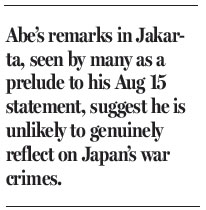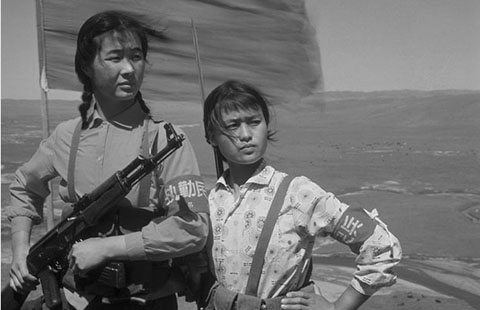US should keep Abe on right side of history
Updated: 2015-04-28 07:19
By Wang Ping(China Daily USA)
|
|||||||||
President Xi Jinping and Japanese Prime Minister Shinzo Abe held a meeting, their second since November, on April 22 on the sidelines of the 2015 Asian-African Summit in Jakarta, where Abe vowed to uphold Japan's past apologies for the atrocities his country committed before and during World War II and hoped "very much to improve Japan-China relations".
Yet in his address to the summit earlier on that day, Abe expressed deep remorse over the war led by Japan without mentioning whether he would abide by the statements of his predecessors or offer sincere apologies to the Asian countries that suffered under Japan's "colonial rule and aggression" before and during WWII.
With many countries set to commemorate the 70th anniversary of the end of WWII, Abe as the leader of a former fascist power will attract close attention when he addresses the US Congress on April 29 and issues a statement in Japan on Aug 15.
On April 20, six days before he began his weeklong visit to the US, The New York Times said Abe had failed to settle Japan's wartime history. "The success of the (US) visit also depends on whether and how honestly Mr Abe confronts Japan's wartime history," the newspaper's editorial said.
Indeed, a few Japanese right-wing politicians have been trying since the 1980s to restore Japan's "dignity" by revising, even denying, the country's military past. But the result of their sordid efforts has been the opposite: Japan has been losing its credibility as a peace-loving country that prioritizes economic recovery over everything else. And the Abe administration's aggressive military strategy has made that loss of credibility more profound.
Notably, Abe is a semi-nationalist rather than a pro-US Japanese leader. Unlike his predecessor Yukio Hatoyama, who said Tokyo and Washington should treat each other as equals, Abe wants to use the US-Japan alliance to maximize Japan's interests. His ambiguous attitude and vague remarks on Japan's wartime atrocities before visiting the US suggest that he intends to neither own up to Japan's wartime past nor apologize to Washington for attacking Pearl Harbor in 1941. Instead, he might even expect an apology from the US for the devastating atomic bombings of Hiroshima and Nagasaki.
Moreover, in a TV interview on April 20, he said it is not necessary to repeat the wordings of apology for Japan's wartime actions, as he will "uphold" the statements made by previous Japanese prime ministers, including Tomiichi Murayama's heartfelt apology in 1995.
So what will Abe focus on in his Washington speech? Apparently, Japan's postwar accomplishments and interests, that is, reconciliation and alliance with the US, and its contribution to the world peace and prosperity. His remarks in Jakarta, seen by many as a prelude to his Aug 15 statement, suggest he is unlikely to genuinely reflect on Japan's war crimes.
Abe's "obsession" with the future has been criticized by many even in Japan. On April 21, Murayama said Abe does not want to acknowledge Japan's colonial rule and aggression, which explains "why he wants to refrain from repeating those wordings, as well as why people are closely watching the tone of the statement". And a day earlier, Katsuya Okada, leader of the opposition Democratic Party of Japan, urged Abe to be careful to ensure that he does not give an impression that the Japanese understanding of the past has moved backward.
Since the US administration has invited Abe to address at the Congress, making him the first Japanese prime minister to do so, it could turn a blind eye to his distorted perception of Japan's shameful past for the sake of strategic interests. But being a responsible global leader, the US is also obliged to keep Japan on the right track of history.
The author is a researcher in Japan studies at the Chinese Academy of Social Sciences.

(China Daily USA 04/28/2015 page12)

 Kathmandu's quake survivors struggle for food, water, tents
Kathmandu's quake survivors struggle for food, water, tents
 Photographer captures changes in China
Photographer captures changes in China
 Ten photos you don't wanna miss
Ten photos you don't wanna miss
 Villager decorates wall with banknote images
Villager decorates wall with banknote images
 Around the world on solar power
Around the world on solar power
 Ten ways to make travel more environmentally friendly
Ten ways to make travel more environmentally friendly
 Trainer who handles dogs with love, patience
Trainer who handles dogs with love, patience
 International rescue teams head to quake-hit Nepal
International rescue teams head to quake-hit Nepal
Most Viewed
Editor's Picks

|

|

|

|

|

|
Today's Top News
Nepalis wait for quake help as death toll passes 4,000
New US-Japan defense guidelines inject instability in East Asia
iPhone sales in China surge, boost Apple's profits
61 suspects back home to be tried
Chinese, Koreans seek Japan apology
China rescue team starts work
Three US citizens among dead in avalanche after Nepal quake
Chinese rally across US to support NYC police officer under indictment
US Weekly

|

|







